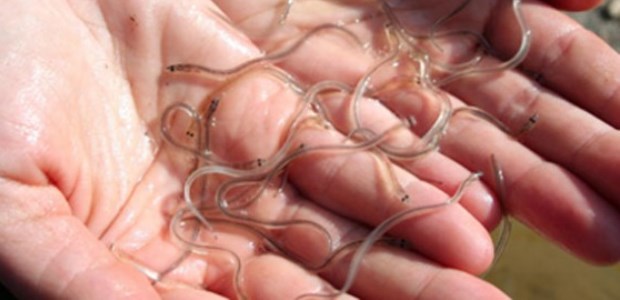
Fisherman Pleads Guilty in Eel Trafficking Case
The Maine fisherman was snared by Operation Broken Glass, a U.S. Fish and Wildlife Service investigation.
Richard Austin, a Maine fisherman, pleaded guilty April 14 in a federal district court in Norfolk, Va., to trafficking juvenile American eels, known as elvers or "glass eels," in violation of the Lacey Act. Acting Assistant Attorney General Jeffrey H. Wood of the Justice Department's Environment and Natural Resources Division, U.S. Attorney Dana J. Boente for the Eastern District of Virginia, and Acting Director Jim Kurth of the U.S. Fish and Wildlife Service announced the plea.
Austin admitted to illegally transporting or selling elvers in interstate commerce that had been harvested illegally in Virginia and Massachusetts. He had traveled to locations near Yorktown, Williamsburg, and Newport News, Va., as well as Massachusetts, to illegally harvest elvers, then sold them to dealers from Illinois and New York who exported them to buyers in Asia. From 2013 to 2015, Austin trafficked approximately $189,374 worth of illegally harvested elvers.
The plea was the result of "Operation Broken Glass," an FWS investigation into the illegal trafficking of American eels that has resulted in guilty pleas for 12 people who, combined, trafficked more than $2.94 million worth of elvers. "Eels are highly valued in east Asia for human consumption. Historically, Japanese and European eels were harvested to meet this demand; however, overfishing has led to a decline in the population of these eels. As a result, harvesters have turned to the American eel to fill the void resulting from the decreased number of Japanese and European eels," according to the U.S. Department of Justice.
It reports that harvesters and exporters of American eels in the United States can sell elvers to East Asia for more than $2,000 per pound. Because of the threat of overfishing, elver harvesting is prohibited in the United States in all but two states, Maine and South Carolina, which heavily regulate elver fisheries, requiring that individuals be licensed and report all quantities of harvested eels to state authorities.
The offense in this case is a felony carrying a maximum penalty of five years in prison, a fine of up to $250,000, or up to twice the gross financial gain or loss, or both. Austin's sentencing is set for July 19.